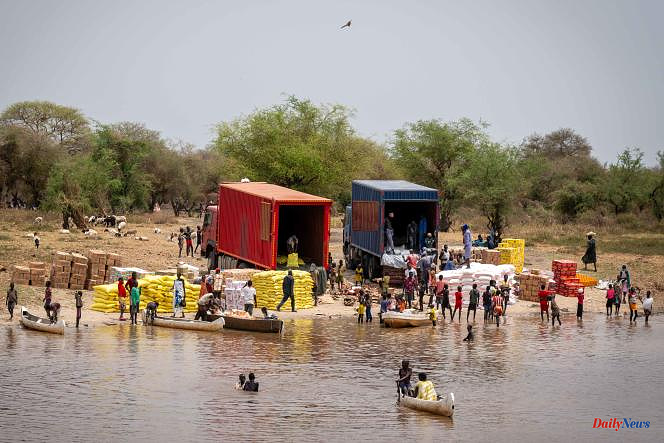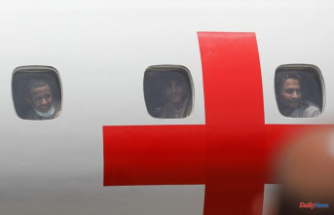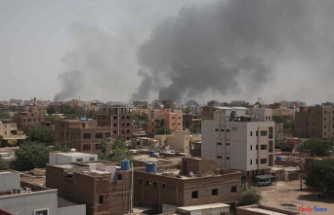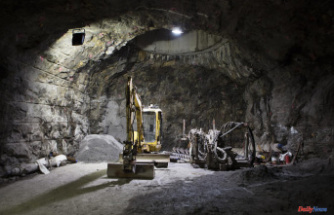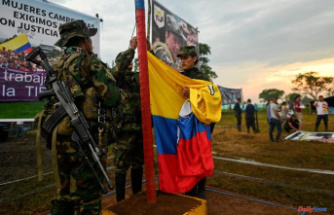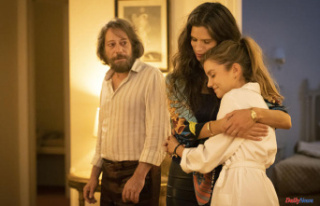The end-of-year celebrations have turned tragic in Gumuruk. "Fear" ("fear" in English), "Fuck Murle" ... Insults and threats inscribed in felt-tip pen still streak the walls of the police station of this village in the Greater Pibor region, in eastern South Sudan. All around, houses and vegetable gardens were set on fire, the offices of international NGOs burned, trees felled. Before leaving, the attackers took care to sign: "Lou Nuer, 26/12/2022", named after one of the clans of neighboring Jonglei, where the heavily armed Dinka and Nuer herders are allied to attack the murle lands.
The inhabitants who had fled into the forest or reached the town of Pibor on foot, about thirty kilometers from the village, have been returning gradually since mid-February, motivated by the resumption of humanitarian aid. Distributions that are far from meeting all needs. "Look at him, do you think he'll still be here in a month?" cowardly, laconic, Atoti Kaku Korok, a traditional leader, pointing to an emaciated old man. "This attack is the worst we have experienced," he said. We can't even imagine wanting revenge after that. »
According to a statement from the chief administrator of Grand Pibor, the coordinated attacks carried out between December and January against several villages in the area "cost the lives of 661 people. No less than 1,810 Murle women and children were abducted and nearly 868,000 head of cattle stolen. By the end of March, the efforts of the authorities, supported by humanitarian agencies, had enabled the release of 117 women and children and their reunification with their families in Greater Pibor. A difficult return for women survivors who, in many cases, have been separated from one or more of their children, who remained in captivity in Jonglei. Perpetrated by young armed herders of Dinka and Nuer ethnic groups, these raids have steadily worsened since South Sudan's independence in 2011.
Steal cattle to survive and get married
Despite the 2018 peace agreement that ended five years of civil war in the country, intercommunal violence has resumed in several regions, amid power struggles. "The constant violence is one of the root causes of the terrible humanitarian crisis in South Sudan," lamented the UN experts of the commission on human rights, who point to the "politicization of belonging ethnic ".
The Murle, who had led an armed insurrection against the government of President Salva Kiir, obtained in 2014 from the young South Sudanese state the creation of the administrative zone of Greater Pibor, a semi-autonomous entity, supposed to put an end to the "marginalization which the Murle felt they were victims of when they were ruled from Bor, the capital of Jonglei. But cattle raids, kidnappings, attacks and reprisals continued on both sides of the new border.
Impoverished, armed and with no other prospects, the young people of the region “steal cattle to survive and to be able to marry. Because paying an increasing dowry, which goes up to 60, 70 cows, is difficult without raiding a neighboring community,” said Juma Ngare Allan, 35, a teacher in Pibor.
The signing of a peace agreement between the Dinka, Nuer and Murle communities in Pieri, a village in Jonglei, in March 2021 – the conclusion of a promising reconciliation initiative – failed to contain the violence, which led to the offensive of "unprecedented" magnitude against the Murle on December 24, 2022, "while the whole world was celebrating the birth of Jesus", recalls with bitterness John Kaka Gayn, the spokesman for the authorities in Pibor.
"Emergency" food insecurity
Geographical isolation, poverty, insecurity… It is the infernal spiral in which the community seems trapped. This is evidenced by the high proportion (45%) of inhabitants of Greater Pibor classified as in a situation of "emergency" food insecurity, level 4 out of the 5 on the scale used by the UN to measure the phenomenon. A crisis situation that affects all regions of South Sudan to a greater or lesser extent, where 9.1 million inhabitants depend on humanitarian aid to survive (79% of the population).
As in Gumuruk, this deprivation is particularly visible in Pibor. Under a large tree overhanging the river that crosses the city, a group of a hundred women are trying to sell their meager merchandise. Small piles of lalob pits (local variant of dates) and dried antelope meat laid out in front of her, Nyachun Kolen had no customers all day. "It's all I have to survive and it's not enough," sighs the one whose face is covered in pointillist tattoos, a common practice for older women among the Murle.
Like the other mothers in Pibor, she earns a few pounds by selling local products. Or carrying on his head and on canoes the goods unloaded from the trucks across the river, where the only safe road from Juba ends. But, when the rains start in May, and for six months, nothing will arrive here by road… Even the airstrip of the city will be too muddy and impassable for planes.

